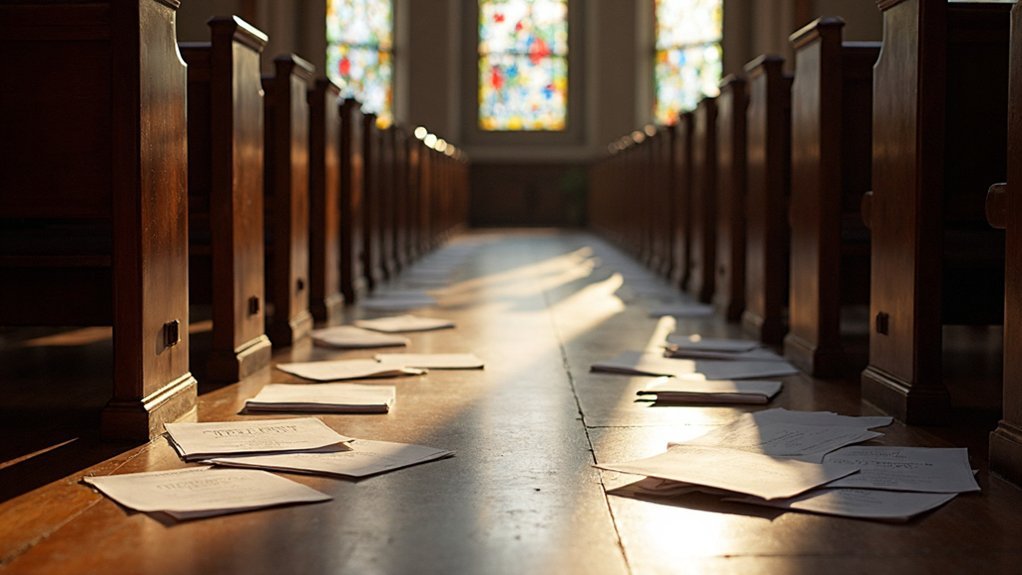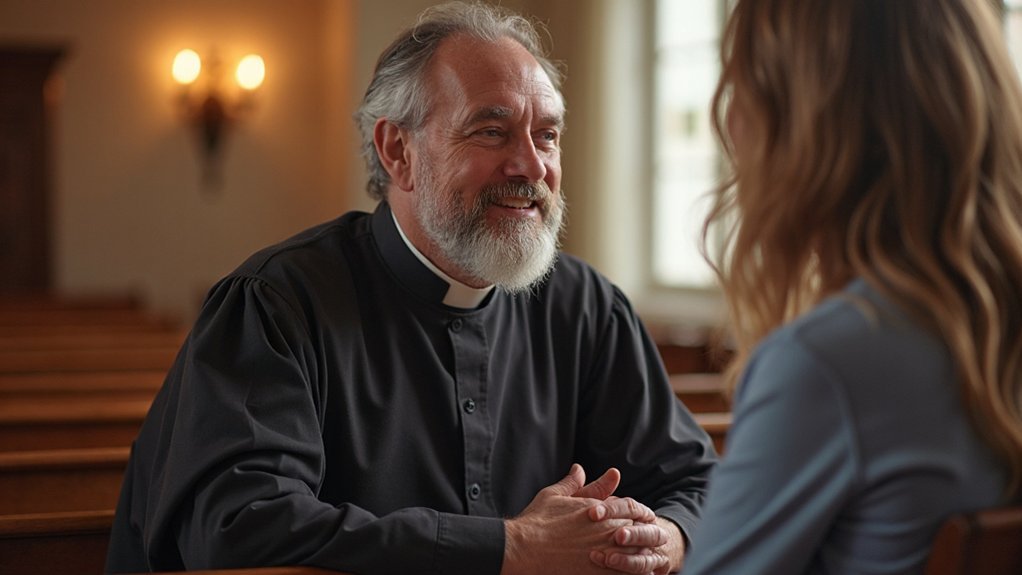You’ve probably heard conflicting messages about divorce and the Catholic Church, leaving you confused about where you actually stand spiritually. The truth is more complex than the simple “divorce is a sin” narrative many people believe. While the Church maintains strong teachings about marriage’s permanence, the reality involves seven pivotal distinctions that could completely change how you understand your situation. These facts might surprise you and offer hope you didn’t know existed within Catholic teaching.
The Catholic Church Does Not Consider Divorce Itself a Mortal Sin

While many Catholics assume that divorce automatically constitutes a mortal sin, the Church’s official teaching is more intricate than this common belief suggests.
The Catholic Church doesn’t automatically consider divorce itself a mortal sin that would prevent you from receiving communion. According to the Catechism of the Catholic Church, various factors can diminish your culpability, even if you’re divorced and remarried. The Bible provides biblical reasons for divorce, including interpretations from scripture regarding adultery, abandonment, and other grounds for ending a marriage in Christian teachings.
Divorced Catholics Can Still Receive Holy Communion Under Certain Circumstances
Can divorced Catholics still receive Holy Communion at Mass? The Catholic Church doesn’t automatically ban divorced Catholics from receiving communion unless they’ve remarried outside the Church. A divorced Catholic can participate fully in sacramental life. Navigating a loveless marriage can be a challenging situation, but the Church provides guidance for maintaining emotional well-being. However, if you’ve entered a new marriage without completing the annulment process, you’ll need pastoral guidance before receiving communion again.
Not Every Marriage Was Truly Joined by God Despite Taking Place in a Church

Although a wedding ceremony takes place in a beautiful church with all the traditional elements, this doesn’t automatically mean God joined that particular marriage together. Catholic marriages require proper intention and freedom to become a valid marriage. Without these elements, attending religious ceremonies won’t create a sacramental marriage—the union fundamentally remains a civil marriage, and the marriage never received God’s blessing. Exploring the Divine’s Role in Relationships may provide further insight into the Catholic Church’s perspective on the spiritual aspects of marriage.
Catholic Annulment Examines the Beginning of Marriage, Not Its End
This understanding leads us to examine how the Catholic Church approaches situations where a marriage may not have been valid from the start. When Catholic marriage fails, divorced Catholics can seek annulment through Church teaching. This process determines whether a valid marriage ever existed by examining the beginning, not the end, focusing on original impediments or intentions. Spiritual signs may also indicate God’s call to marriage, such as increased emotional maturity, personal growth, and a strong desire for a lasting partnership.
Remarriage Without Annulment Creates the Barrier to Receiving Communion

When you remarry without obtaining an annulment first, the Catholic Church considers your new relationship adulterous, which prevents you from receiving Holy Communion. The Church doesn’t recognize divorce, so it views marriage as permanent.
If you’re divorced and remarried without annulment, you can’t remarry in the Catholic Church sacramentally, though attending Mass remains encouraged.
Divorce Can Lead to Personal Growth and Deeper Spirituality
Many divorced Catholics uncover that their painful experience becomes a pathway to deep personal metamorphosis and spiritual awakening. You shouldn’t feel outside the church because Catholic divorce often deepens your spiritual life.
As Catholic Bishops acknowledge, you’re not less committed than any family member. This difficult expedition can strengthen your relationship with God through counseling and reflection.
The Church Calls for Compassion Rather Than Judgment Toward the Divorced

Personal growth through difficult circumstances aligns perfectly with the Catholic Church’s official stance on how divorced individuals should be treated within the faith community.
The Church calls for compassion rather than judgment toward the divorced, emphasizing ministry over condemnation. You shouldn’t face assumptions about your commitment or forgiveness. Instead, the Church seeks to provide healing and understanding for your complex circumstances.
Conclusion
You don’t need to carry shame about divorce within the Catholic Church. The Church recognizes life’s intricacies and offers pathways for healing and participation. If you’re divorced, you can still receive sacraments under certain conditions. Remember that annulment examines your marriage’s beginning, not its conclusion. Whether you’re considering divorce or already divorced, seek guidance from your parish priest. The Church emphasizes compassion over judgment in your adventure.

